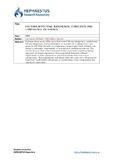| dc.contributor.author | Lawrence, Michael | |
| dc.contributor.author | Makridakis, Spyros | |
| dc.date.accessioned | 2015-12-08T09:15:01Z | |
| dc.date.available | 2015-12-08T09:15:01Z | |
| dc.date.issued | 1989 | |
| dc.identifier.issn | 0749-5978 | |
| dc.identifier.uri | http://hdl.handle.net/11728/6367 | |
| dc.description.abstract | Eighteen time series differing in their trend (three categories), randomness (three categories), and presentation on a graph (two categories) were given to 350 MBA students in a laboratory experiment. Each student was asked to estimate judgmentally a forecast and confidence interval. The results showed that when compared to the commonly used forecasting approach of simple regression, the judgmental forecasts differed significantly in their response to trend and presentation but not to randomness. The judgmental confidence intervals were very influenced by trend but insufficiently influenced by randomness when compared to the regression estimates. | en_UK |
| dc.language.iso | en | en_UK |
| dc.publisher | Elsevier | en_UK |
| dc.relation.ispartofseries | Organizational Behavior and Human Decision Processes;Volume 43, Issue 2 | |
| dc.rights | Copyright © 1989 Published by Elsevier Inc. | en_UK |
| dc.rights.uri | http://creativecommons.org/licenses/by-nc-nd/4.0/ | en_UK |
| dc.subject | Research Subject Categories::SOCIAL SCIENCES::Business and economics::Economics | en_UK |
| dc.title | Factors affecting judgmental forecasts and confidence intervals | en_UK |
| dc.type | Article | en_UK |
| dc.doi | 10.1016/0749-5978(89)90049-6 | |


